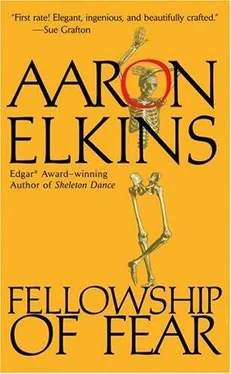Aaron Elkins - Fellowship Of Fear
Здесь есть возможность читать онлайн «Aaron Elkins - Fellowship Of Fear» весь текст электронной книги совершенно бесплатно (целиком полную версию без сокращений). В некоторых случаях можно слушать аудио, скачать через торрент в формате fb2 и присутствует краткое содержание. Жанр: Классический детектив, на английском языке. Описание произведения, (предисловие) а так же отзывы посетителей доступны на портале библиотеки ЛибКат.
- Название:Fellowship Of Fear
- Автор:
- Жанр:
- Год:неизвестен
- ISBN:нет данных
- Рейтинг книги:5 / 5. Голосов: 1
-
Избранное:Добавить в избранное
- Отзывы:
-
Ваша оценка:
- 100
- 1
- 2
- 3
- 4
- 5
Fellowship Of Fear: краткое содержание, описание и аннотация
Предлагаем к чтению аннотацию, описание, краткое содержание или предисловие (зависит от того, что написал сам автор книги «Fellowship Of Fear»). Если вы не нашли необходимую информацию о книге — напишите в комментариях, мы постараемся отыскать её.
Fellowship Of Fear — читать онлайн бесплатно полную книгу (весь текст) целиком
Ниже представлен текст книги, разбитый по страницам. Система сохранения места последней прочитанной страницы, позволяет с удобством читать онлайн бесплатно книгу «Fellowship Of Fear», без необходимости каждый раз заново искать на чём Вы остановились. Поставьте закладку, и сможете в любой момент перейти на страницу, на которой закончили чтение.
Интервал:
Закладка:
Besides that, everyone knew there weren’t any elephants around Torralba, and there never had been any. Elephants came from China. Even he, who couldn’t read and had never been to school, knew that. And even if there had been elephants, and even if those stones were bones, why would anyone want to see them when they could see real, live elephants-from China-in the zoo in Barcelona, only a few hours down the road? Last year, the schoolchildren had gone to Barcelona on a big bus, and they had gone to the zoo and seen living elephants tied with chains on their legs.
And as for those rocks the authorities said were cavemen’s tools, that was the most foolish of all. Was every chipped rock you could hold in your hand a tool? Then the authorities were welcome to come and dig all they wanted out of the wheat fields every year. That would make everyone happy.
Still, when he had been mayor four years ago and they had offered him the "honor" of being custodian of the museo, he had accepted, and he had quietly kept the post, although he was no longer the mayor. Putting aside the tremendous glory of it, if they were crazy enough to give him 500 pesetas a month for sweeping out the dust once a week (more or less) and for opening it up to the crazy professors who came to see it, why should he object? And then, of course, there were the propinas -the tips. If Rafael or Joaquin knew about those, they’d be fighting for the job.
Already today he had gotten a propina of 500 pesetas- a month’s salary-from the ugly man with the fierce eyes. He hadn’t liked the man, hadn’t liked his looks-a small, angry man with the body of a monkey and the cunning face of a weasel. And the eyes! Brr, a bad man. But he had paid good money, and all he had wanted was the key to the museo and Ignacio’s promise to let no one else in that day, even this professor and his students. And on top of it all, Ignacio had been promised another 500 pesetas afterwards. He doubted that he would really get it, but who knew? In any case, he would certainly follow his instructions. The weasel-faced man was not one he would care to make angry.
But the professor was going to be angry. He had already sent Ignacio a telegram two days ago-to receive his first telegram, he had had to live for eighty-two years-saying he was coming with his students to see the site. Well, let him be angry. Ignacio would claim he never received it. How was the professor to know?
Across the square, one of them spoke hesitantly to old Vicente, who pointed toward Ignacio. The man thanked old Vicente courteously and began to come across the square, followed by the others. So that was the professor. A big man, but with a soft smile. Better to make him angry than the other one.
Ignacio would have no trouble pulling the wool over his eyes. In his mind, he rehearsed what he would say: Telegram, senor? To me? Surely not, never in my life. And I am extremely sorry, but the museo is closed on Thursdays. Perhaps tomorrow? For a small deposit I can reserve it entirely for you…
Being denied admission to the little museum had been a severe disappointment for Gideon, so much so that he had angrily accused the old man of lying. At once ashamed of himself-although he was sure he was right-he had tipped him ten pesetas and then walked with the class up to the site to see if the day could be salvaged.
He found that it could indeed. For Gideon, it was enough just to be there, standing on the very site itself, delivering the lecture of a lifetime, the lecture of an anthropology professor’s dreams.
They stood in the middle of a flat depression a few hundred feet in diameter, at the foot of an arid, steep hill. In the distance, small, parched wheat fields ran irregularly up a broad, sloping hillside. Aside from those, the only sign of man was the squat little concrete-block museum at the edge of the depression. Five hundred feet away, a line of delicate trees marked the all-but-dry bed of the Ambrona River and provided the only relief in a scorched, shimmering landscape of dun, beige, and ochre. The sky was covered by a thin, gray-white cloud-sheet that muted the sun’s brilliance but offered no protection against its heat.
Around him was a semicircle of fifteen rapt students, so enthralled that note-taking was forgotten.
Professor Gideon Oliver was giving it his all: "It was on the spot on which we stand, then, that Homo erectus ceased to be a scavenging animal that moved in straggling, starving bands. It was here that man was born. It was here that mankind began, here that the first seeds of civilization were sown… three hundred thousand years ago…ten thousand generations."
The rich words, describing an unimaginable expanse of time, thrilled him as much as they did the students, and his voice vibrated and soared with emotion.
"It would have been this time of year, during the fall migration to the lowlands. Thirty of them- Elephas antiquus, the huge straight-tusked elephant-would have come screaming and trumpeting over this hill from the northwest." Fifteen heads swiveled to follow his pointing finger; fifteen pairs of eyes peered anxiously up the parched hillside, as if the long-extinct monsters were about to come pounding down upon them.
"Where we are now was a bog; this barren hillside was covered with trees and long grasses. Driving the elephants was a gigantic grass fire. The wind was blowing toward the southeast, and the elephants were swept down the hillside into the bog. Over there"-he pointed again, this time toward the trickling river-"other fires had been set to prevent them from crossing to solid ground."
Gideon paused and took a deep breath, savoring the struggle that was as alive as the twentieth century for him. "And so here they stayed," he said in a deeper, quieter voice, "panicked and stumbling in the deep mud; giant males, females…infants. At the edge of the bog stood the hunters, the fire-setters. They had only to wait-and they were patient-for the mired elephants to become helpless. Then, one by one, they were killed with stones and wooden spears. The next day they were butchered. It was the earliest known evidence of such an enterprise in the entire history of the world."
Gideon breathed deeply again. He was tired. The site held deep meaning for his conception of man, and he had tried his best to convey it for thirty minutes. From the glazed, worn looks of the students, he had been successful.
"To sum it up then," he said a little wearily, "what makes Torralba epochal in the history of mankind is that here, for the first time, a project was undertaken that required two, or maybe even three family groups of twenty or thirty individuals to cooperate -to trust each other, to take risks. It was the beginning of everything-language, mathematics, laws. Here we took that first tentative step from caring only for blood kin toward being members of a society of man."
The beginnings of a breeze ruffled their hair and made a soft sound in the dry brush on the hill. For perhaps twenty seconds, a respectful silence endured. Gideon’s words echoed in his own mind, as he knew they did in the minds of his students. Two or three of them bent toward the gravelly ground and contemplatively picked at embedded fragments with their fingers. Gideon knew exactly what they were wondering: Is this stone right here in my hand one of the rocks they threw at the elephants so long ago? Has it lain here undisturbed for three thousand centuries, until I, here and now, picked it up? Was the last person to touch it a naked, savage ape-man?
It was precisely the kind of near-mystic musing that had first attracted Gideon to anthropology, and it still sent chills down his spine.
The mood was broken by one of the less receptive students, a glib, bearded civilian from the personnel office.
"A couple of questions, Dr. Oliver." From his tone, Gideon knew they would be arguments, not questions. He steeled himself. "One, from what you say, was this the start of civilization, or wasn’t it really the start of our rape of the environment? Just what do we mean by ‘civilization’?- The ability to kill animals by the hundreds?"
Читать дальшеИнтервал:
Закладка:
Похожие книги на «Fellowship Of Fear»
Представляем Вашему вниманию похожие книги на «Fellowship Of Fear» списком для выбора. Мы отобрали схожую по названию и смыслу литературу в надежде предоставить читателям больше вариантов отыскать новые, интересные, ещё непрочитанные произведения.
Обсуждение, отзывы о книге «Fellowship Of Fear» и просто собственные мнения читателей. Оставьте ваши комментарии, напишите, что Вы думаете о произведении, его смысле или главных героях. Укажите что конкретно понравилось, а что нет, и почему Вы так считаете.












